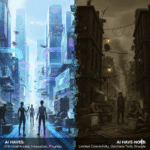The most cited definition of democracy is Abraham Lincoln’s view toward this system, i.e. democracy is a government “of the people, by the people, and for the people. “Democracy is such a system in which every citizen is regarded as equal and they have equal power in electing their representatives. The above statement about democracy that everyone is equal is itself contradictory as democracy always supports the argument that the one with greater potential must be allowed to exploit their potential to the fullest and gain as much as they can from it. Isn’t it a contradiction? Moreover, equality itself sounds more like a communist/socialist ideology than democratic. Democracy, a true democracy that envisions a free-market economy with no reservations from the state is almost obsolete. Governments always have reservations on various issues and they control the market by the issuance of laws and bye-laws. Whereas the free market economy’s major assumption was the market will adjust itself and no intervention is needed from the state. What I am trying to infer is: today democracy can’t sustain within itself without giving any priority to social welfare and all such stuffs. A pure democracy is obsolete. So called Democratic nations (those who presumes themselves to be the custodian of democracy) also today can’t undermine Marx’s philosophy and his Social welfare theories while drafting their plans and policies. So, Democracy in its pure form is extinct from this world. Today’s democracy is based on a socialist democratic Ideology. i.e. a right balance to address social needs along with democratic norms and principles. I personally view Democracy as such a system which helps rich to grow richer and a poor to become poorer. Nations like Nepal will never rise in democracy. One person one vote, this equality between individual is envisioned with the assumption that all the voters are rational. Rationality of a voter in a nation like Nepal how could it be expected? Are they (Nepali) aware enough and capable enough to take rational decisions? A nation where a Rs. 100 note and a plate of meat and rice before Election Day may change voters decision, how could democracy be best practiced in such a nation. Everything successful in the west doesn’t mean to be successful here. They have the highest literacy percentage. The educated and conscious goes to cast their vote during the election in the west as irrational voters don’t care more about politics but here we have an entirely different version. All the irrational voters reach the polling booth whereas rational voters enjoy the Election Day as a vacation. We need a system where there is basic freedom for the citizen but very strict policies which will help to develop and progress the nation.
For me democracy is the highest level of freedom where I’m free to do whatever I wish and moreover I won’t be charged for my deeds. If there is any type of obstacles (i.e. laws) that won’t allow me to do whatever I wish then it’s not a democracy for me. To enjoy democracy you need a society and its members who have strong moral conduct and ethics so that no criminal misconduct will be performed. Anything less than complete freedom is not democracy for me and I know it’s impossible to have a democracy that incorporates my vision.
Search
About
Hi, I’m Anusha Neupane, a passionate data analytics professional with a Master’s degree in Predictive Analytics from Curtin University. With a strong foundation in data-driven decision-making, I specialize in turning raw data into actionable insights that drive growth and efficiency.
My academic journey, coupled with practical experience, has equipped me with expertise in statistical modeling, data visualization, and predictive modeling using tools like Python, R, and Tableau. I thrive on solving complex problems and uncovering hidden patterns that inform better business decisions.
I created this website to showcase my data analytics projects, share insights, and connect with like-minded professionals. Here, you’ll find examples of my work, including real-world case studies, interactive dashboards, and detailed analytics reports.
Feel free to explore my portfolio, and don’t hesitate to reach out if you’d like to collaborate or learn more about my work.
Archive
Categories
Recent Posts
Tags
#AI #life #technology Blog business cycle economy export feminism import life nepal palmoil poem trade
Gallery







